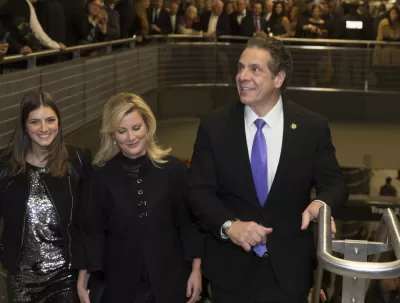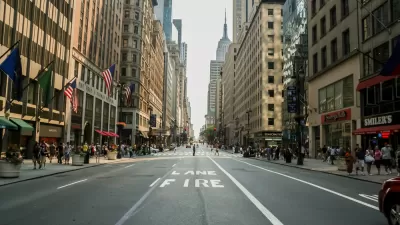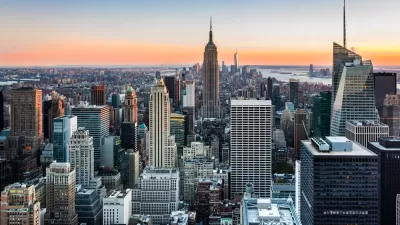The Democratic governor proposed a ban on single-use plastic bags in his state-of-the-state address on Jan. 15. Nearly two years earlier, he signed a bill that prevented New York City from charging for bags as the District of Columbia and Boston do.

"Among Gov. Andrew M. Cuomo’s goals in the coming year is for the Democrats who now control the State Legislature to ban single-use plastic bags," reports Azi Paybarah on Jan. 22. Bans and/or fees on single-use plastic bags exist in hundreds of cities across the nation, such as Boston where it took effect last month, but statewide bans and/or fees exist in only two states and the District of Columbia.
- Hawaii after the County of Honolulu passed a ban in 2012, joining the state's three other counties that had already done so
- California passed legislation in 2014 that was signed by Gov. Jerry Brown, but the law was subjected to a referendum two years later due to opposition by the plastics industry. Fifty-two percent of voters supported the legislation by approving Proposition 67 and rejecting Proposition 65 on Nov. 8, 2016.
- The District of Columbia enacted a nickel plastic and paper bag fee in January 2010, and it appears to have worked well.
However, it must be noted that more states ban local governments from enacting plastic bag reduction ordinances than those that have adopted them.
Following in the footsteps of Arizona and Missouri in 2015 and Idaho in 2016, Michigan passed legislation in 2016, signed by Lt. Gov. Brian Calley, to preempt cities or counties from regulating single-use plastic bags or other disposable containers. The law was precipitated by an ordinance passed by Washtenaw County (county seat is Ann Arbor, home of the University of Michigan) to charge a 10-cent bag fee.
Similarly, Gov. Cuomo signed legislation on Feb. 14, 2017, "effectively killing a law that would have imposed a 5-cent fee on plastic bags in New York City, disappointing environmentalists as well as city leaders who characterized the move as a classic case of Albany’s overreach," reported Jesse McKinley for the Times. Cuomo objected to the fee being kept by the merchants, yet that's what's done with the nickel fee in D.C. and Boston, and the 10-cent fee in California.
The current proposal, described in the governor's Jan. 13 announcement, includes an expansion of the beverage container recycling known as the Bottle Bill. Times reporter Michael Gold of the Times reports more extensively on the proposal and background on the issue, including current state legislation to "establish guidelines for carryout bag waste reduction."
[Also see Gold's related article via Planetizen: New York City Polystyrene Ban Took Effect New Year's Day, January 4, 2019: Thanks to two recent New York State court rulings, disposable food and beverage containers will no longer be made from polystyrene in the nation's largest city.]
FULL STORY: N.Y. Today: Single-Use Plastic Bags May Soon Be Banned

Alabama: Trump Terminates Settlements for Black Communities Harmed By Raw Sewage
Trump deemed the landmark civil rights agreement “illegal DEI and environmental justice policy.”

Study: Maui’s Plan to Convert Vacation Rentals to Long-Term Housing Could Cause Nearly $1 Billion Economic Loss
The plan would reduce visitor accommodation by 25% resulting in 1,900 jobs lost.

Planetizen Federal Action Tracker
A weekly monitor of how Trump’s orders and actions are impacting planners and planning in America.

Wind Energy on the Rise Despite Federal Policy Reversal
The Trump administration is revoking federal support for renewable energy, but demand for new projects continues unabated.

Passengers Flock to Caltrain After Electrification
The new electric trains are running faster and more reliably, leading to strong ridership growth on the Bay Area rail system.

Texas Churches Rally Behind ‘Yes in God’s Back Yard’ Legislation
Religious leaders want the state to reduce zoning regulations to streamline leasing church-owned land to housing developers.
Urban Design for Planners 1: Software Tools
This six-course series explores essential urban design concepts using open source software and equips planners with the tools they need to participate fully in the urban design process.
Planning for Universal Design
Learn the tools for implementing Universal Design in planning regulations.
Caltrans
Smith Gee Studio
Institute for Housing and Urban Development Studies (IHS)
City of Grandview
Harvard GSD Executive Education
Toledo-Lucas County Plan Commissions
Salt Lake City
NYU Wagner Graduate School of Public Service





























